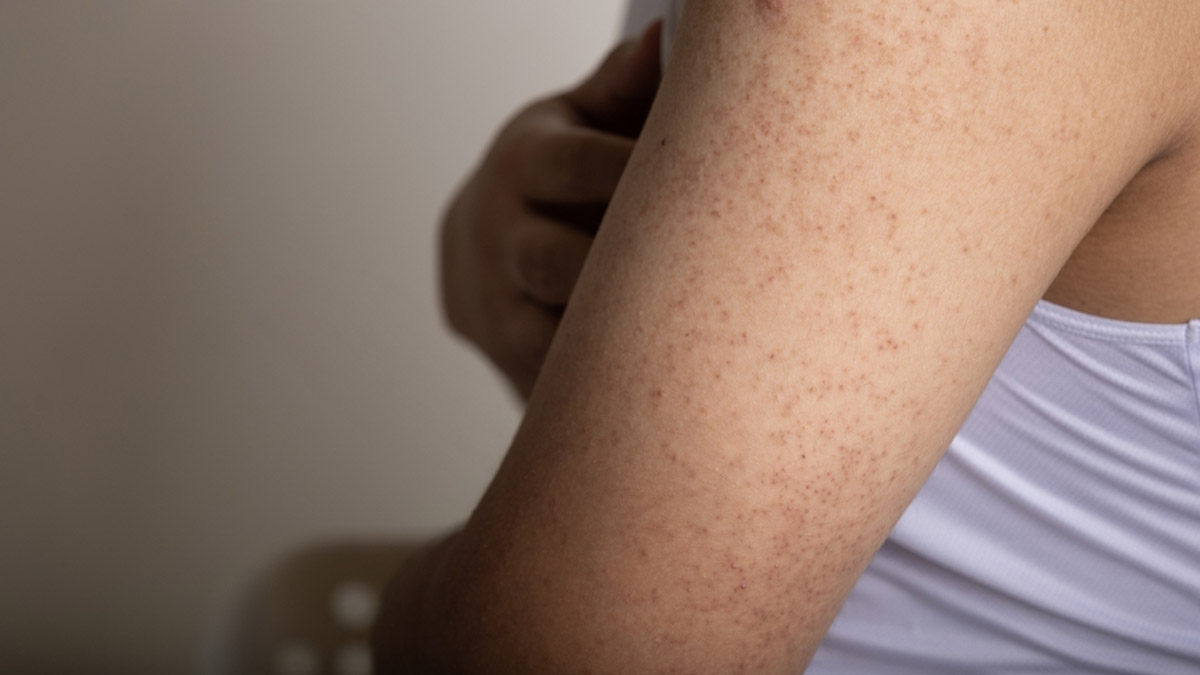
Keratosis Pilaris (KP), commonly known as 'chicken skin,' is a prevalent skin condition marked by rough, tiny bumps that usually appear on the upper arms, thighs, cheeks, or buttocks. While KP is harmless, it can be frustrating and sometimes affect self-esteem. The good news is that there are several natural remedies you can try to help alleviate the symptoms and improve the appearance of your skin.
Table of Content:-
What Is Keratosis Pilaris

Keratosis pilaris is a persistent condition most commonly seen in adolescents. It typically appears as small bumps with follicular involvement and surrounding redness, often found on the extensor surfaces of the upper arms and thighs, as stated in StatPearls.
KP occurs when keratin, a protein that protects the skin, builds up and blocks the hair follicles, forming hard plugs. This can result in patches of rough, bumpy skin. While the exact cause of KP is unknown, it tends to run in families and is more common in people with dry skin or conditions like eczema.
Natural Remedies for Keratosis Pilaris
Exfoliation

Regular exfoliation can help remove the buildup of dead skin cells and keratin that cause KP. Natural exfoliants like sugar or sea salt can be particularly effective. Here’s how to use them:
- Sugar Scrub: Mix 1 cup of sugar with 1/2 cup of coconut oil and a few drops of an essential oil of your choice. Wet the skin, then apply the mixture and gently massage in circular motions. Rinse with warm water.
- Sea Salt Scrub: Mix one cup of fine sea salt with 1/2 cup of olive oil and gently scrub the affected areas with the mixture. Rinse thoroughly with warm water.
Moisturising
Keeping your skin well-hydrated is crucial for managing KP. Look for natural moisturisers that can soothe and soften your skin.
- Coconut Oil: It is known for its hydrating and anti-inflammatory properties. It can help reduce the roughness of KP. Apply a thin layer to the affected areas after bathing while your skin is damp.
- Shea Butter: It is packed with vitamins A and E, making it a fantastic moisturiser that can improve your skin's texture. Massaging it into your skin every day will keep it soft and smooth.
Also Read: From Dull Skin To Acne: Expert Explains How Your Face Reflects Vitamin Deficiencies
Apple Cider Vinegar

Apple Cider Vinegar (ACV) has natural exfoliating properties and can help balance the skin’s pH level. To use ACV for KP:
- Start by mixing apple cider vinegar with an equal part of water to get the desired solution.
- Put the mixture on the afflicted areas using a cotton ball.
- After letting it sit for a few minutes, give it a quick rinse with some warm water.
Baking Soda
Baking soda acts as a gentle exfoliant and can help unclog pores. Here’s how to use it:
- Make a paste by mixing two tablespoons of baking soda with one cup of water.
- After completely rinsing with warm water, massage the paste into the afflicted regions with gentle pressure.
- Repeat this procedure once or twice weekly.
Oatmeal Baths

Oatmeal is known for its soothing properties and can help alleviate the itchiness and irritation associated with KP.
- Add one cup of colloidal oatmeal to your bathwater.
- Soak in the bath for 15-20 minutes.
- Apply a moisturiser after patting your skin dry.
- Regular oatmeal baths can help calm and soften your skin.
Aloe Vera
Aloe vera has anti-inflammatory and moisturising properties, making it beneficial for treating KP.
- Start by extracting aloe vera gel from a fresh leaf.
- Directly apply the gel to the regions that are impacted.
- After leaving it on for 20 to 30 minutes, rinse it off with lukewarm water.
- Use aloe vera daily to see improvements in your skin’s texture.
Essential Oils
Certain essential oils can help manage KP due to their anti-inflammatory and moisturising properties. Some effective ones include:
- Tea Tree Oil: It is known for its antibacterial and anti-inflammatory properties and can help reduce bumps. Mix a few drops with a carrier oil like coconut oil and apply it to the affected areas.
- Lavender Oil: Lavender oil is soothing and can help with skin regeneration. Combine a few drops with a carrier oil and massage it into your skin.
Dietary Adjustments
Sometimes, dietary changes can have a positive impact on your skin. Hence, focus on a diet rich in vitamins A, D, and E, as well as omega-3 fatty acids. Foods like leafy greens, carrots, fish, nuts, and seeds can help improve your skin health from the inside out.
Staying well-hydrated is essential for maintaining healthy skin. To help flush out toxins and keep your skin moisturised, drink lots of water throughout the day.
[Disclaimer: This article contains information for informational purposes only, hence, we advise you to consult your own professional if you are dealing with any health issues to avoid complications.]
Also watch this video
How we keep this article up to date:
We work with experts and keep a close eye on the latest in health and wellness. Whenever there is a new research or helpful information, we update our articles with accurate and useful advice.
Current Version